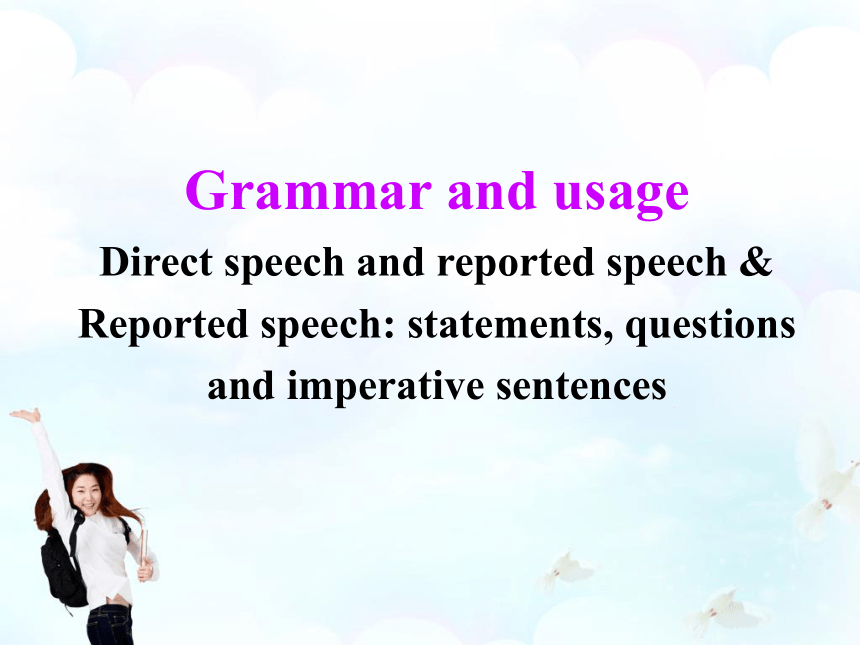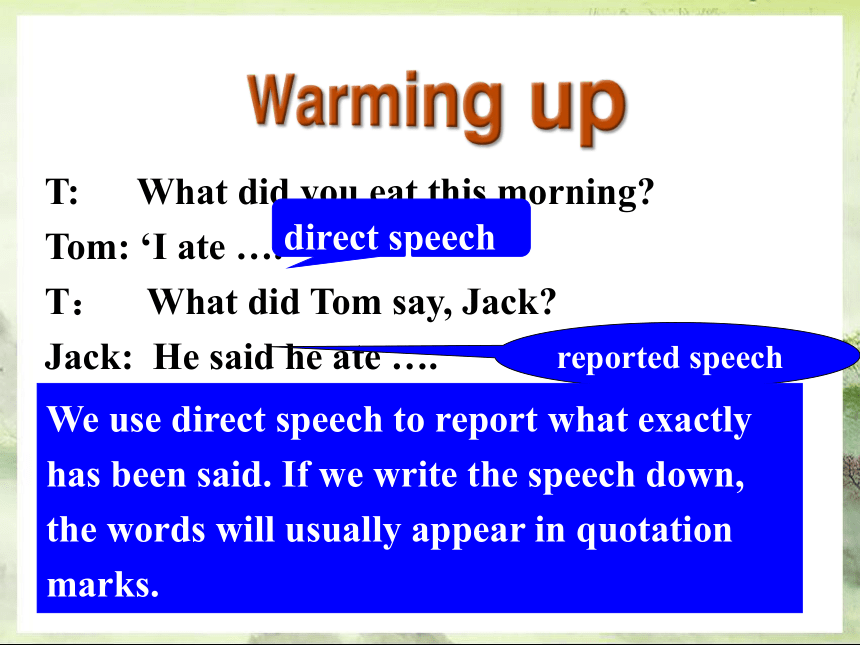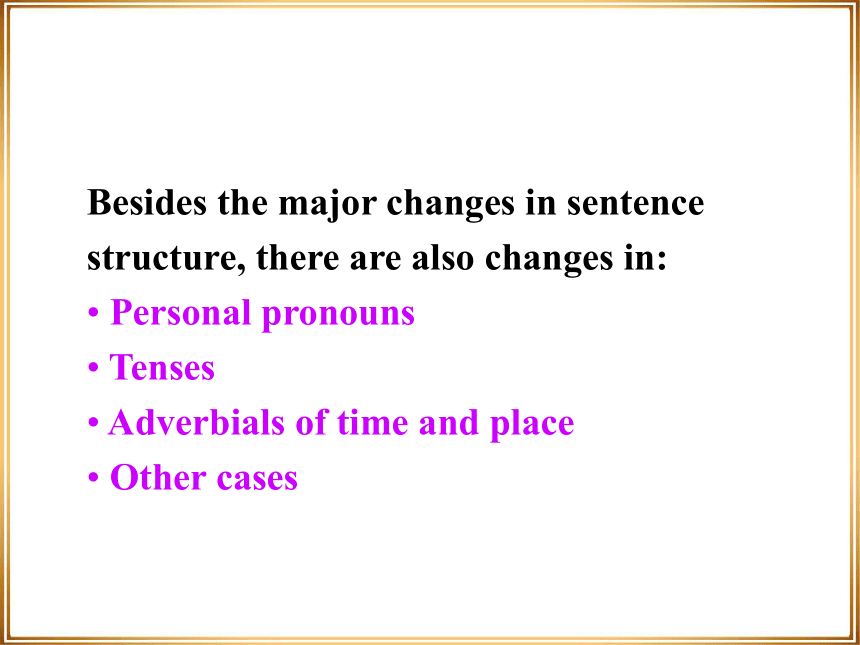Unit 1 Advertising Grammar and usage(1)课件(44张PPT)
文档属性
| 名称 | Unit 1 Advertising Grammar and usage(1)课件(44张PPT) |

|
|
| 格式 | zip | ||
| 文件大小 | 1.5MB | ||
| 资源类型 | 教案 | ||
| 版本资源 | 牛津译林版 | ||
| 科目 | 英语 | ||
| 更新时间 | 2020-01-09 00:00:00 | ||
图片预览












文档简介
课件44张PPT。Unit 1Unit 1 Advertising Grammar and usage
Direct speech and reported speech &
Reported speech: statements, questions and imperative sentences T: What did you eat this morning?
Tom: ‘I ate ….’
T: What did Tom say, Jack?
Jack: He said he ate ….direct speechreported speechWe use direct speech to report what exactly has been said. If we write the speech down, the words will usually appear in quotation marks.1. Which one is direct speech and which one is reported speech?
He said, ‘I will go to school tomorrow.’
She told us something secret.
2. Change the direct speech into reported speech.
She said, ‘This film is quite interesting.’
‘Finish the project tomorrow.’ he said to me.(direct speech)(reported speech)She said that that film was quite interesting.He asked me to finish the project the next day.(Change what has been said to an object clause or an infinitive phrase.)How can we change direct speech into reported speech?
We can change direct speech into reported speech by using an object clause or an infinitive phrase.For example:
He said, ‘I’m used to such embarrassing comments.’
He said that he was used to such embarrassing comments.‘We must not give up in the face of pressure!’ she said.
She encouraged us not to give up in the face of pressure.Besides the major changes in sentence structure, there are also changes in:
Personal pronouns
Tenses
Adverbials of time and place
Other casesPersonal pronouns:
She said, ‘I did some research.’
She said that she had done some research.
Ann said, ‘I have finished this letter.’
Ann said that she had finished that letter.How to change the tenses:‘Light travels at a great speed,’ said Ms Li.
Ms Li said that light travels at a great speed.We do not change the tense when we report a proverb or a fact that doesn’t change over time.Adverbials of time and place:
e.g. Tom said, ‘I am working here
today.’
Tom said he was working there
that day.The following table shows other examples:that day/yesterday, etc.the next day/the following day, etc.the day before/ the previous day, etc.the month after/the following montha week before/ a week earlier, etc.Other cases:
Some more examples of the changes:thatthosegoRead the advertisement and complete the letter on Page 9.
Answers:
1. _______ 2. ________ 3. __________
4. _______ 5. ________ 6. __________
7. _______ 8. ________ 9. _________
10. ______waswould behad readthatwouldhad boughtthatwouldthoseherReported speech:
statements, questions and imperative sentences1. Statements
We use noun clauses introduced by that
to report statements. The word that can
be omitted.
e.g. She said (that) advertisements were
almost everywhere nowadays.There are more reporting verbs other than say and tell:advise explain insist promise
announce suggest warne.g. The write explained that PSAs were
often run for free.We use noun clauses introduced by whether/if to report yes/no questions.
e.g. Matt asked Ann, ‘Does Jason deserve
this ward?’
Matt asked Ann whether/if Jason
deserved this award.2. QuestionsWe use noun clauses introduced by wh-words to report wh-questions.
e.g. ‘Where did you find the
advertisements for jobs abroad?’
Bill asked.
Bill asked where I had found the
advertisements for jobs abroad.3. Imperative sentences To report imperative sentences, we can
use the structure: reporting verb +
object +(not) + to infinitive
e.g. The candidate said to the manager,
‘Please give me five minutes for
preparation.’
The candidate asked the manager to
give him five minutes for preparation. There are other verbs that can be used
in this structure to report imperative
sentences:advise encourage invite recommend warne.g. ‘Don’t believe every advertisement
you read,’ Michelle said to me.
Michelle advised me not to believe
every advertisement I read.总 结 如果直接引语是一个陈述句,变成间接
引语时用that引导,有时也可省略。
e.g. She said, ‘Father, the boy is very
naughty now.’
She told her father (that) the boy
was very naughty then.2. 如果直接引语是客观真理,变为间接引语
时,时态不变。
e.g. ‘Light travels much faster than sound,’
she said to me yesterday.
She told me the day before that light
travels much faster than sound.3. 如果直接引语中有明确表示过去的时间状
语,在变为间接引语时,一般过去时不必
变为过去完成时。
e.g. He said, ‘The great inventor was born
in 1884.’
He told me that the great inventor was
born in 1884.4. 如果直接引语是一般疑问句,变为间接引语
时用whether/if 引导,且用陈述句语序。
e.g. She asked me, ‘Are you the happiest
person in your family?’
She asked me whether/if I was the
happiest person in my family.5. 如果直接引语是特殊疑问句,变为间接引语
时,仍用该特殊疑问词,用陈述句语序。
e.g. She asked me, ‘When will the
advertisements be on air?’
She asked me when the advertisements
would be on air.6. 转述祈使句时使用该结构: 转述动词(ask/
tell/ order/ advise/ remind/ warn/ insist/
suggest/ invite/ encourage…) +宾语+ (not) to
do
e.g. ‘Go and see a doctor after class,’ my
teacher said to me.
My teacher advised me to go and see a
doctor after class.Direct and Indirect SpeechRead Part A on Page 11 and practise reporting questions using whether/if or wh-words.
Answers:
2. Wang Qin ________________________
__________________________________.
3. Lu Kai ___________________________
__________________________________.asked how it could help him remember English words.asked whether/if it taught listening and speaking 4. Liu Fang _______________________
______________________________
_______________________________.
5. Gu Jin _________________________
_______________________________.asked what the designerwould do if she was not satisfied
with the softwareasked whether/if it was easyto useRead the advertising tips on Page 11 and report each of them to your boss.
Answers:
2. The expert encourages us to
_______________________________.
3. The expert recommends that
________________________________.use interesting and attractive photoswe (should) use eye-catching logos4. The expert suggests that __________
_______________________________
_______________________________.
5. The expert tells us to _____________
_________________________________.we (should)make the slogans short and easymake good useof colours to attract people’s attentionto remember“Are you going to your home town this summer?” he said. He asked me if I was going to my home town that summer.2. “Why didn’t you call me an hour
ago?” he said.He asked why I hadn’t called him an
hour before.A)变下列直接引语为间接引语。3. Mother asked, “What has happened
to you, Xiao Li ?” Mother asked Xiao Li what had happened to him4. He often says “I shall tell you about
them.” He often tells me that he will tell me about them.5. Mr Black said, “I have walked a long
way this week.”Mr Black said that he had walked a long way that week.6. They said to us, “ Are you afraid to
leave this house ?” They asked us if we were afraid to leave that house.B) 填空完成间接引语,每空一词。
1. “Don't forget to give the message to my wife,” he said to Li Ping.
??? He _______?Li Ping _______? _______? forget to give the message to _______?wife.
2. “Mum, please help me find my shirt,” he said.
??? He _______? his mother _______? help?
_______?find _______? shirt. toldnot tohisaskedtohimhis3. “Use your knife to cut the boots open,” the officer said to the guard.
??? The officer _______? the guard? _______?
_______? _______?knife to cut the boots open.
4. “Don't spend too much time on football!” Mother said to me.
??? Mother _______? me? _______ _______?
_______?too much time on football. ordereduse histoldnot totospend5. “Will you sleep and get up early, children?”
Father said.
??? Father _______? the children _______?
_______and _______? up early. askedsleepgetto Finish Part C2 on Page 92 of the
Workbook.
Preview the Task.
Direct speech and reported speech &
Reported speech: statements, questions and imperative sentences T: What did you eat this morning?
Tom: ‘I ate ….’
T: What did Tom say, Jack?
Jack: He said he ate ….direct speechreported speechWe use direct speech to report what exactly has been said. If we write the speech down, the words will usually appear in quotation marks.1. Which one is direct speech and which one is reported speech?
He said, ‘I will go to school tomorrow.’
She told us something secret.
2. Change the direct speech into reported speech.
She said, ‘This film is quite interesting.’
‘Finish the project tomorrow.’ he said to me.(direct speech)(reported speech)She said that that film was quite interesting.He asked me to finish the project the next day.(Change what has been said to an object clause or an infinitive phrase.)How can we change direct speech into reported speech?
We can change direct speech into reported speech by using an object clause or an infinitive phrase.For example:
He said, ‘I’m used to such embarrassing comments.’
He said that he was used to such embarrassing comments.‘We must not give up in the face of pressure!’ she said.
She encouraged us not to give up in the face of pressure.Besides the major changes in sentence structure, there are also changes in:
Personal pronouns
Tenses
Adverbials of time and place
Other casesPersonal pronouns:
She said, ‘I did some research.’
She said that she had done some research.
Ann said, ‘I have finished this letter.’
Ann said that she had finished that letter.How to change the tenses:‘Light travels at a great speed,’ said Ms Li.
Ms Li said that light travels at a great speed.We do not change the tense when we report a proverb or a fact that doesn’t change over time.Adverbials of time and place:
e.g. Tom said, ‘I am working here
today.’
Tom said he was working there
that day.The following table shows other examples:that day/yesterday, etc.the next day/the following day, etc.the day before/ the previous day, etc.the month after/the following montha week before/ a week earlier, etc.Other cases:
Some more examples of the changes:thatthosegoRead the advertisement and complete the letter on Page 9.
Answers:
1. _______ 2. ________ 3. __________
4. _______ 5. ________ 6. __________
7. _______ 8. ________ 9. _________
10. ______waswould behad readthatwouldhad boughtthatwouldthoseherReported speech:
statements, questions and imperative sentences1. Statements
We use noun clauses introduced by that
to report statements. The word that can
be omitted.
e.g. She said (that) advertisements were
almost everywhere nowadays.There are more reporting verbs other than say and tell:advise explain insist promise
announce suggest warne.g. The write explained that PSAs were
often run for free.We use noun clauses introduced by whether/if to report yes/no questions.
e.g. Matt asked Ann, ‘Does Jason deserve
this ward?’
Matt asked Ann whether/if Jason
deserved this award.2. QuestionsWe use noun clauses introduced by wh-words to report wh-questions.
e.g. ‘Where did you find the
advertisements for jobs abroad?’
Bill asked.
Bill asked where I had found the
advertisements for jobs abroad.3. Imperative sentences To report imperative sentences, we can
use the structure: reporting verb +
object +(not) + to infinitive
e.g. The candidate said to the manager,
‘Please give me five minutes for
preparation.’
The candidate asked the manager to
give him five minutes for preparation. There are other verbs that can be used
in this structure to report imperative
sentences:advise encourage invite recommend warne.g. ‘Don’t believe every advertisement
you read,’ Michelle said to me.
Michelle advised me not to believe
every advertisement I read.总 结 如果直接引语是一个陈述句,变成间接
引语时用that引导,有时也可省略。
e.g. She said, ‘Father, the boy is very
naughty now.’
She told her father (that) the boy
was very naughty then.2. 如果直接引语是客观真理,变为间接引语
时,时态不变。
e.g. ‘Light travels much faster than sound,’
she said to me yesterday.
She told me the day before that light
travels much faster than sound.3. 如果直接引语中有明确表示过去的时间状
语,在变为间接引语时,一般过去时不必
变为过去完成时。
e.g. He said, ‘The great inventor was born
in 1884.’
He told me that the great inventor was
born in 1884.4. 如果直接引语是一般疑问句,变为间接引语
时用whether/if 引导,且用陈述句语序。
e.g. She asked me, ‘Are you the happiest
person in your family?’
She asked me whether/if I was the
happiest person in my family.5. 如果直接引语是特殊疑问句,变为间接引语
时,仍用该特殊疑问词,用陈述句语序。
e.g. She asked me, ‘When will the
advertisements be on air?’
She asked me when the advertisements
would be on air.6. 转述祈使句时使用该结构: 转述动词(ask/
tell/ order/ advise/ remind/ warn/ insist/
suggest/ invite/ encourage…) +宾语+ (not) to
do
e.g. ‘Go and see a doctor after class,’ my
teacher said to me.
My teacher advised me to go and see a
doctor after class.Direct and Indirect SpeechRead Part A on Page 11 and practise reporting questions using whether/if or wh-words.
Answers:
2. Wang Qin ________________________
__________________________________.
3. Lu Kai ___________________________
__________________________________.asked how it could help him remember English words.asked whether/if it taught listening and speaking 4. Liu Fang _______________________
______________________________
_______________________________.
5. Gu Jin _________________________
_______________________________.asked what the designerwould do if she was not satisfied
with the softwareasked whether/if it was easyto useRead the advertising tips on Page 11 and report each of them to your boss.
Answers:
2. The expert encourages us to
_______________________________.
3. The expert recommends that
________________________________.use interesting and attractive photoswe (should) use eye-catching logos4. The expert suggests that __________
_______________________________
_______________________________.
5. The expert tells us to _____________
_________________________________.we (should)make the slogans short and easymake good useof colours to attract people’s attentionto remember“Are you going to your home town this summer?” he said. He asked me if I was going to my home town that summer.2. “Why didn’t you call me an hour
ago?” he said.He asked why I hadn’t called him an
hour before.A)变下列直接引语为间接引语。3. Mother asked, “What has happened
to you, Xiao Li ?” Mother asked Xiao Li what had happened to him4. He often says “I shall tell you about
them.” He often tells me that he will tell me about them.5. Mr Black said, “I have walked a long
way this week.”Mr Black said that he had walked a long way that week.6. They said to us, “ Are you afraid to
leave this house ?” They asked us if we were afraid to leave that house.B) 填空完成间接引语,每空一词。
1. “Don't forget to give the message to my wife,” he said to Li Ping.
??? He _______?Li Ping _______? _______? forget to give the message to _______?wife.
2. “Mum, please help me find my shirt,” he said.
??? He _______? his mother _______? help?
_______?find _______? shirt. toldnot tohisaskedtohimhis3. “Use your knife to cut the boots open,” the officer said to the guard.
??? The officer _______? the guard? _______?
_______? _______?knife to cut the boots open.
4. “Don't spend too much time on football!” Mother said to me.
??? Mother _______? me? _______ _______?
_______?too much time on football. ordereduse histoldnot totospend5. “Will you sleep and get up early, children?”
Father said.
??? Father _______? the children _______?
_______and _______? up early. askedsleepgetto Finish Part C2 on Page 92 of the
Workbook.
Preview the Task.
